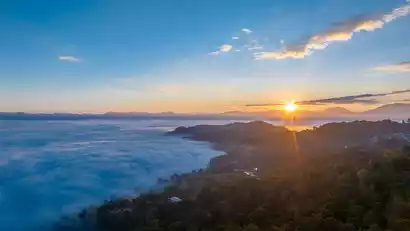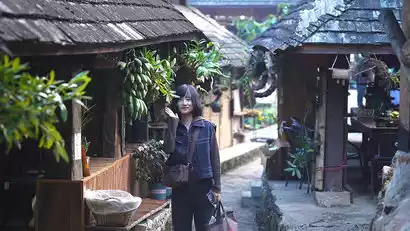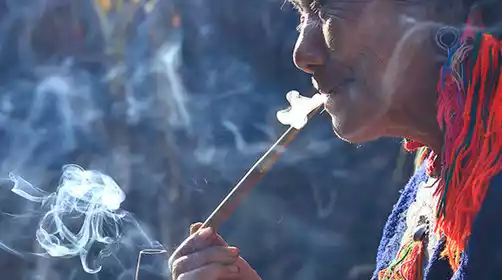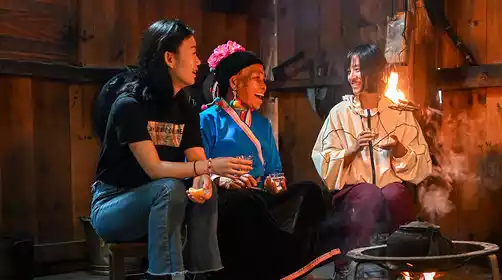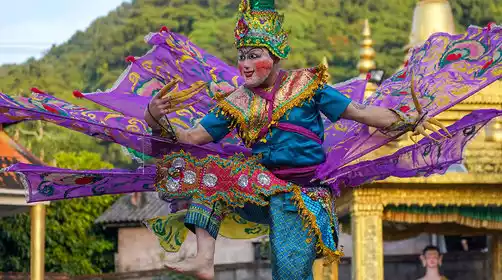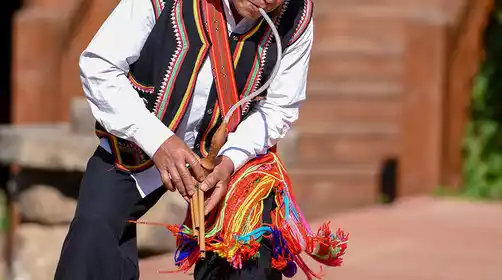Day 1 Various locations → → Pu'er ★ Gathering day
All day
On the all-day gathering day, tourists from around the country will arrive at their hotels in Pu'er and check in. After checking in, they can begin their exploration of the city. Pu'er, the starting point of the Ancient Tea-Horse Road, is the birthplace of the world-renowned Pu'er tea, as well as coffee cultivation, which began in the 1950s. Upon arrival in Pu'er, you can explore the surrounding coffee estates (such as Xiaoaozi Coffee Estate and Yeyatang Valley Estate) or the nearby tea mountains (such as Yixiang Mountain and Dadugang) on your own. Please exercise caution during this free time.
How to get to Pu'er
1. Go to Pu'er to meet up
The collection hotel is located in the city of Pu'er, about 4km away from the airport (Pu'er Simao Airport), and the drive takes about 15 minutes.
Direct flight to Pu'er: For tourists with limited time, you can choose direct flight (direct flights are relatively rare);
Transfer in Kunming: There is one flight from Kunming to Pu'er every day. You can choose to transfer in Kunming, which saves both time and cost.
Kunming-Pu'er High-Speed Train: High-speed trains are now available from Kunming to Pu'er. The journey takes about 3 hours, with frequent departures daily. Please check the specific departure times and fares in real time.
Jinghong-Pu'er train: Take the train from Xishuangbanna to Pu'er, which takes about 40 minutes. Tourists who arrive in Jinghong late and cannot take the bus to Pu'er can choose to take the morning train to Pu'er Station to meet up with the group.
2. Take a bus from Jinghong to Pu'er
To facilitate tourists flying directly to Xishuangbanna to travel to Pu'er, we have specially arranged a bus from Jinghong to Pu'er. Tourists arriving in Jinghong and needing to take the bus to Pu'er should gather at the Gaozhuang Xishuangjing Gate Parking Lot (in front of the Gaozhuang Xishuangjing Integrated Service Hall) at 18:00 on the meeting day and take the bus to the Pu'er meeting hotel.
Day 2 Pu’er → Ximeng
·morning
Entering the Muyiji Sacred Valley, I got my first glimpse into the Wa people's beliefs
Muyiji is believed by the Wa people to be the creator and ruler of all things. Muyiji Sacred Valley is considered the dwelling place of the gods by the Wa people. Entering the sacred valley, you'll find vast, primitive cliff paintings depicting the Wa ancestors' birth and migration from Sigangli, hunting, and sacrificial rituals. Combined with the human head piles beneath the cliffs, a sense of mystery emerges. Hear Wa legends and glimpse the Wa people's integrated worship of nature, ancestors, and spirits.
·afternoon
Immerse yourself in the singing of Wa people and celebrate with local people
After the tour, we'll drive into the Awa Mountains and head to a Wa village on the border. While the village has been completely renovated, its traditional fire pits and ancient tunes remain, and many inheritors of this intangible cultural heritage live there. Upon arrival at the village gate, fellow Wa people line up and sing a resounding and joyful welcome. Once inside, we'll join them in shooting crossbows, playing tops, singing Wa songs and dances, and finally singing "The Awa People Sing New Songs." A glass of wine will connect our hearts.
Special Experience: Learn to Cook a Wa Dish and Get Intoxicated by Wa Songs
The subtropical monsoon of the Awa Mountains brings abundant natural resources. The Wa people, with their ingenuity, use natural ingredients to prepare dishes using traditional methods such as steaming, pounding, and mixing, preserving their green and simple nature. We will follow our Wa guide into the mountains to pick wild vegetables, learn a Wa dish or two, and prepare a special feast for ourselves. After enjoying the meal, a bonfire will be lit, and Wa men and women will play wooden drums, perform a hair-flipping dance, sing a toast song, and join the singing and dancing to celebrate.
After the carnival, people sit around the fire pit, drink tea, or have a glass of wine, and listen to the performance of various instruments they have never seen before, such as the monochord. The ancient tunes are melodious, and the night flows quietly in the firelight.
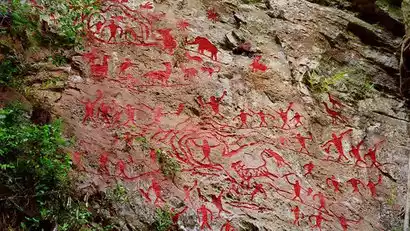
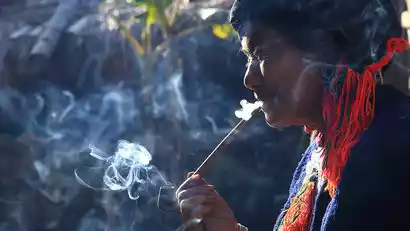
Day 3 Ximeng Full Day
·morning
The national intangible cultural heritage wooden drum dance, playing the wooden drum to feel the pride of the Wa people
The wooden drum, called "Ke Luo" in the Wa language, is considered by the Wa people to be a divine instrument for communicating with the spirits. The Moba selects a date and a red-haired tree. After a sacrifice, the tree is cut down, and the entire village sings "Jialinsai" (Garinsai) together to make the wooden drum. After liberation, it gradually evolved into an entertainment instrument. Today's Wooden Drum Festival evolved from ancient Wa religious activities. The annual "Wooden Drum Festival" originated from primitive religious worship. Follow the wooden drum team, praying and celebrating along the way, and immerse yourself in this wooden drum carnival.
·afternoon
Enjoy a light hike to Mengsuo Longtan and experience primitive worship at Longmoye Holy Land
After lunch, we'll enter the Mengsuo Longtan Scenic Area and head to the Longmoye Sacred Land, home to a shrine covered in ox heads. The Wa people, who have lived in the Awa Mountains for generations, believe in animism and have long considered oxen sacred and totem. Step inside Longmoye and experience the power of primitive worship, adorned with the solemnity and myriad forms of ox heads. This truly captivating and moving site is a truly captivating experience.
·night
Wooden drum sounds, good luck comes, wooden drum festival bonfire carnival
After dinner, head to the Wooden Drum Festival bonfire party and join the Wa people in their revelry. When the deep, melodious "dong dong" of wooden drums fills the air, the entire Wa Mountain region erupts in excitement. To the cheerful beat, people beat wooden drums, perform the hair-swinging dance, and revel in the bonfire. Everyone forgets their age and identity as they dance to their heart's content.
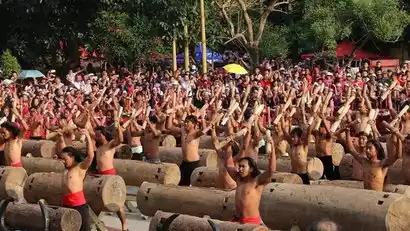
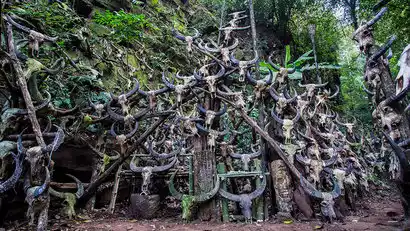
Day 4 Ximeng → Menglian
·morning
Wander around Nayun Ancient Town and experience the ancient history of the Dai people
Nayun Ancient Town is a rare surviving Dai ancient town. Divided by a strict registration system into three towns—the Upper Town, the Middle Town, and the Lower Town—and two villages, Mangfanggang and Mangfangmao, Nayun Ancient Town is a unique example of the Dai feudal system, influenced by the cultures of the Central Plains, Southeast Asia, and India. Allow plenty of time to explore the ancient town's official residences, residential buildings, Buddhist temples, pagodas, official roads, sacred trees, the village center, and ancient wells.
Special experience: Visit the intangible cultural heritage teacher and experience paper cutting and gold water clepsydra
Dai paper-cutting is a national intangible cultural heritage. Common motifs include peacocks, elephants, red deer, swimming fish, and various exotic animals and birds. Other motifs include bamboo houses, pagodas, temples, and Dai figures, reflecting everyday life and possessing a distinct local flavor. Gold-water clepsydra, a technique derived from Dai paper-cutting, involves cutting out desired shapes and then applying gold or gold foil to them. It is often used as a temple decoration, and the golden patterns against the dark red walls appear particularly resplendent. We will learn Dai paper-cutting and gold-water clepsydra from an intangible cultural heritage inheritor, and then create our own souvenir.
·afternoon
Enjoy a light hike in the tropical rainforest, with waterfalls and lush greenery.
Menglian has a subtropical climate. High heat and humidity are the primary characteristics of tropical rainforests, driving rapid plant growth. Upon arrival in Menglian, we'll embark on a light hike through the rainforest, ascending a stream-side trail through the lush greenery of the rainforest. At the end of the trail, a cascading waterfall, nestled against the backdrop of typical rainforest vegetation, creates a truly stunning photo opportunity.
Special Experience | Visit a Dai Family and Experience the Divine Bird Dance
The teacher is a master of music and dance, and is known for his specialties such as the Kinnara Dance, the Wax Strip Dance, the Long Armor Dance, and the Red Deer Dance. These dances are part of the Xuanfusi ritual music and dance, and most are listed as intangible cultural heritage. We will enjoy a performance by the teacher and his students in front of the Golden Pagoda. The Divine Bird Dance, performed in human-faced bird costumes, is particularly breathtaking. The delicate peacock tail feathers, bound to the body, open and close, create a graceful and agile dance, blending grace and power. After the performance, if you're interested, you can interact with the teacher, learn some dance moves, and try on the Divine Bird Dance props.
After enjoying the dance, you will enjoy a Dai dinner at the teacher's home and hear stories about her journey to pass on the art. Throughout her thirty-year dance career, the teacher has not only continuously recruited students and passed on the art, but has also continuously innovated. A representative example is the lightweight props for the Divine Bird Dance, making performances more labor-efficient. However, she often feels the difficulty of passing on the art.
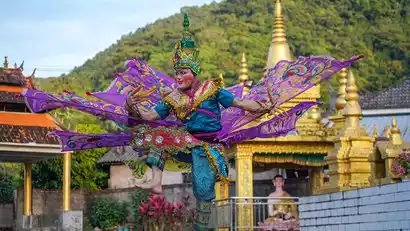
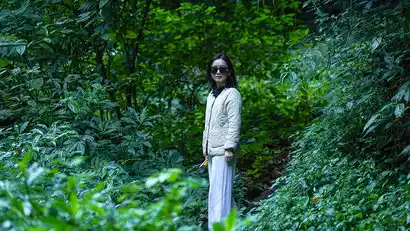
Day 5 Menglian → Jingmai Mountain
·morning
Feel the fireworks and experience the local food culture at the Menglian Morning Market
The bustling atmosphere of a city is concentrated in the morning market. There are many strange foods in Menglian's morning market, which are colorful and dazzling. You may have never seen them before. Some of them you have tasted in the special meals in the past few days but have never seen before. Chat with the locals, learn about various wild vegetables and their cooking methods, and marvel at the locals' imagination for food.
As soon as they can walk, they can sing: Lao Dabao encounters the Lahu people
After breakfast, we'll travel to the renowned Lahu village of Lao Dabao. Lahu, meaning "tiger hunters," prides itself on the idea that "as soon as they can talk, they can sing; as soon as they can walk, they can dance." They once represented Yunnan on the Spring Festival Gala. Visit a Lahu family and learn about the past and present of the Lahu people in their stilt houses. Over dinner, enjoy a Lahu song and dance performance, listen to a Lahu toast song, and learn a Lahu dance, experiencing the authentic singing, dancing, and warm hospitality of southwestern Yunnan's ethnic groups.
Special Experience: Lahu Lusheng Dance, Learn about Intangible Cultural Heritage
Lusheng Dance is the representative dance of the Lahu people. Lahu people insert five bamboo tubes into a gourd to make a Lusheng, which can produce melodious tunes. They dance while playing the Lusheng. Most of the dance movements are derived from the daily life of the Lahu people. There are dances that express production labor such as sharpening knives, weeding, and plowing, as well as frog dances and sika deer dances that imitate animals. The simple happiness flows with the dance steps.
·afternoon
Take a light hike through the ancient tea forest and learn about the past and present of this world heritage site
Since the 10th century, the Bulang people have discovered wild tea trees and cultivated them artificially, developing a unique "under-forest tea" cultivation method that has persisted for over a thousand years, leaving behind five precious ancient tea forests. Upon arrival at Jingmai Mountain, we'll travel to the Dapingzhang Millennium Ancient Tea Garden in Jingmai Mountain, where we'll wander the grounds and discover these unassuming yet time-honored ancient tea trees.
Visit Wengji Ancient Village and watch the sunset in the mountains
Finally, we arrived at the Wengji Bulang Ancient Village. The village's pristine state of preservation and the simplicity of its villagers were truly moving. The ancient trees, represented by 3,000-year-old cypresses, the ancient tea trees, and the traditional tea culture made this ancient village speechless yet profound. We walked through the Wengji Ancient Temple and the heart of the village, listened to the history of the Bulang people, and viewed the quaint buildings and roads in the village, gaining a deeper understanding of the culture of Jingmai Mountain.
·night
Special Experience: Fireside Night Chat, Roasted Tea, and Bulang Singing
The Bulang people are recognized by academics as the forefathers of tea cultivation in Yunnan. Numerous thousand-year-old tea trees remain in Wengji, where it's common for both men and women to drink roasted tea and smoke dry tobacco. In the evening, a special Bulang family banquet is arranged. Afterward, gather around a traditional fire pit and enjoy a pot of traditional roasted tea. Watch the local elders, who drink every three days, never forgetting the leisurely life of tea picking, and experience the charm of this millennial tea-growing people. As the sanxian (three-stringed instrument) plays, the ancient, melodious tune slowly unfolds, transporting you back a thousand years. Learn a few words of Bulang dialect and experience the Bulang people's simplicity and warmth, captured in tea and song.
We stayed at an inn in Jingmai Mountain that night, bidding farewell to the hustle and bustle of the city and enjoying the tranquility of Jingmai Mountain. Looking up, we saw the brilliant starry sky. Here, we could see the world and ourselves.
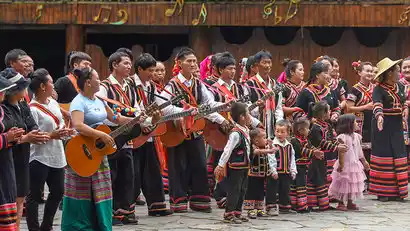
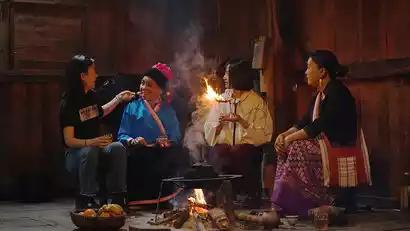
Day 6 Jingmai Mountain → Jinghong ★ Disbandment Day
·morning
Sunrise at Jingmai Mountain, the sea of clouds rippling like a fairyland
Get up early to watch the sunrise. The temperature plummets at night, and condensation creates a chance to witness a sea of clouds. Waves of cloud lap against the mountain's base before gradually receding, shrouding the entire tea mountain in mist. It's truly a dreamlike experience. Admire the beauty of Pu'er Tea Mountain as the sun rises. Alternatively, wake up early to the sound of insects chirping and enjoy a lazy night's sleep amidst the tranquility of Jingmai Mountain.
Ancient Village Citywalk: Telling the Customs of the Aboriginal People of Tea Mountain
The Bulang people are recognized by academics as the forefathers of tea cultivation in Yunnan. Jingmai Mountain boasts numerous thousand-year-old tea trees, where it's common for men and women to drink roasted tea and smoke dry tobacco. After breakfast, we'll travel to Mangjing Village, one of the nine ancient villages in the Jingmai Mountain Ancient Tea Forest Cultural Landscape in Pu'er. Home to the well-preserved Bee God Tree and a temple dedicated to the ancestors of tea, these villages reveal the harmonious coexistence of generations of local people with nature. Finally, we'll visit Nuogan Ancient Village, the primary filming location for the TV series "Home at One Point." The Dai people here may differ from the typical Dai tradition. Long-time residents of Jingmai Mountain, they possess both the gentleness of traditional Dai and the boldness of the mountains. Truly captivating is the village's quaint simplicity and tranquility. The original stilt houses are well-preserved, and the villagers live comfortably within the village. This peaceful atmosphere has earned the village its reputation as a "true paradise."
Jingmai Mountain Heritage Exhibition Center, witness the charm of world cultural heritage
Then we went to the Jingmai Mountain Heritage Exhibition Center, where sand table maps of Jingmai Mountain, production tools, ethnic costumes, etc. are displayed. Wandering around the exhibition center, you can form an overall impression of Jingmai Tea Mountain from the perspectives of history, culture, and the factors that led to its successful application for World Heritage.
·afternoon
Send you to the airport/station and say goodbye at the end of your trip
We will depart Jingmai Mountain around 14:00 and arrive at Xishuangbanna Gasa Airport around 18:00 for a group transfer. We will arrive at Xishuangbanna Railway Station around 18:30 for a group transfer. For the return trip, please book a train departing after 19:30 or a flight departing after 19:30. Please relax this schedule during holidays. If you need to continue to Jinghong City, you will be dispersed near Manting Park.
P.S.: Lancang Jingmai Airport also has flights from Lancang to Kunming. If you need to catch a flight there, you can leave the group early in Huimin Town and take a taxi to Lancang Jingmai Airport. The drive from Menglian to Lancang Jingmai Airport is about 1.5 hours. Please be careful to manage your time to avoid missing your flight.
